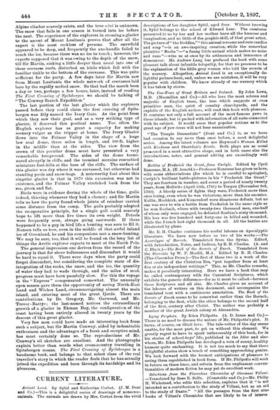Battles of Frederick the Great, from Carlyle. Edited by Cyril
Ransome, M.A. (E. Arnold.)—Professor Ransome has given us here, with some abbreviations (for which he is careful to apologise), Carlyle's brilliant battle-pictures in his " Frederick the Great." They are fourteen in number, and cover a period of nearly twenty years, from Mollwitz (April 10th, 1741) to Torgau (November 3rd, 1760). A bloody series of fights they were, Frederick more than once losing, even when he was victorious, more than his enemies. Kollin, Hochkirk, and Kunersdorf were disastrous defeats, but no one was ever to win a battle from Frederick in the same style as he won Rosbach, where with twenty-two thousand men, one-half of whom only were engaged, he defeated Soubise's sixty thousand. His loss was five hundred and forty-one in killed and wounded, while the French lost eight thousand in all. All the battles are illustrated by plans.
Mr. R. H. Charles continues his useful labours on Apocalyptic literature. We have now before us two of his works :—The Apocalypse of Baruch. Translated from the Syriac. Edited, with Introduction, Notes, and Indices, by R. H. Charles. (A. and C. Black.)—The Book of the Secrets of Enoch. Translated from the Slavonic by W. P. Morfill, M.A. Edited by R. H. Charles. (The Clarendon Press.)—The first of these two is a work of the first century of the Christian Era, "put together from at least five or six independent writings." This, as Mr. Charles remarks, makes it peculiarly interesting. Here we have a book that may be called contemporary with the Canonical Scriptures, which exhibits the generic difference—for so it must be called—between these Scriptures and all else. Mr. Charles gives an account of the labours of writers on this document, and accompanies the translated text with a continuous annotation. The Book of the Secrets of Enoch seems to be somewhat earlier than the Baruch, belonging to the first, while the other belongs to the second half of the first, century after Christ. The author was probably a member of the great Jewish colony at Alexandria.






































 Previous page
Previous page